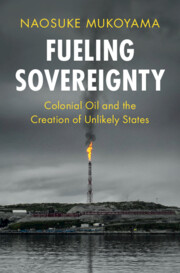Book contents
- Fueling Sovereignty
- LSE International Studies
- Fueling Sovereignty
- Copyright page
- Dedication
- Contents
- Figures
- Tables
- Acknowledgments
- 1 Introduction
- 2 Theory of Separate Independence
- 3 Colonial Oil and Decolonization in Borneo
- 4 Colonial Oil and Decolonization in the Lower Gulf
- 5 Separate Independence in Other Settings
- 6 Varying Historical Impacts of Resource Endowment
- 7 Conclusion
- References
- Index
6 - Varying Historical Impacts of Resource Endowment
Published online by Cambridge University Press: 14 March 2024
- Fueling Sovereignty
- LSE International Studies
- Fueling Sovereignty
- Copyright page
- Dedication
- Contents
- Figures
- Tables
- Acknowledgments
- 1 Introduction
- 2 Theory of Separate Independence
- 3 Colonial Oil and Decolonization in Borneo
- 4 Colonial Oil and Decolonization in the Lower Gulf
- 5 Separate Independence in Other Settings
- 6 Varying Historical Impacts of Resource Endowment
- 7 Conclusion
- References
- Index
Summary
After uncovering oil’s role in decolonization, one question immediately emerges: what about other natural resources? Although oil is neither the only fossil fuel on which we depend nor the only resource that produces a substantial amount of wealth, it appears to be the only natural resource that can lead to separate independence. This chapter compares oil and other natural resources to achieve a more comprehensive understanding of the relationship between natural resources and territorial sovereignty. Through an investigation of coal, precious metals, and natural gas, it argues that natural resources can lead colonial areas to divergent outcomes – namely amalgamation, separate independence, and secessionism – after decolonization depending on (1) their commercial value and (2) the timing of their discovery. While resources with low economic value did not affect the territoriality of states, those with high value resulted in three different outcomes. Resources discovered before or during the process of colonization often resulted in amalgamation into a larger entity. Those discovered between colonization and decolonization often resulted in separate independence. Finally, those discovered after decolonization often led to secessionism.
- Type
- Chapter
- Information
- Fueling SovereigntyColonial Oil and the Creation of Unlikely States, pp. 158 - 192Publisher: Cambridge University PressPrint publication year: 2024

